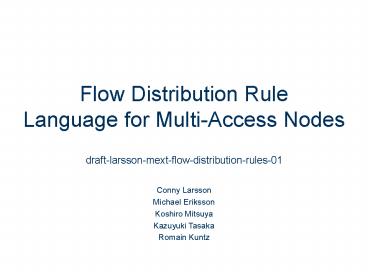Flow Distribution Rule Language for Multi-Access Nodes - PowerPoint PPT Presentation
Title:
Flow Distribution Rule Language for Multi-Access Nodes
Description:
A MRI cannot match as much field: traffic class, extension headers, ... the BU (BID is included in the BU already), But needed if we separate it from the BU/BA. ... – PowerPoint PPT presentation
Number of Views:13
Avg rating:3.0/5.0
Title: Flow Distribution Rule Language for Multi-Access Nodes
1
Flow Distribution RuleLanguage for Multi-Access
Nodes
- draft-larsson-mext-flow-distribution-rules-01
Conny Larsson Michael Eriksson Koshiro
Mitsuya Kazuyuki Tasaka Romain Kuntz
2
Evolution of the Draft
- There have been two documents about flow
distribution languages - draft-mitsuya-monami6-flow-distribution-policy-04.
txt - draft-larsson-monami6-filter-rules-02.txt
- We agreed to merge the two documents into
- draft-larsson-mext-flow-distribution-rules-00.txt
3
Which problem do we solve?
- The MEXT charter includes the following
deliverable - "- A "Flow/binding policies exchange" solution
for an exchange of policies from the mobile
host/router to the Home Agent and from the Home
Agent to the mobile host/router influencing the
choice of the Care-of Address and Home Agent
address. The solution involves two
specifications, one for the policy format and
another for its transport both Standard Track."
- The Multiple Care-of Address Registration draft
(draft-ietf-monami6-multiplecoa-08.txt) defines
how multiple care-of addresses can be registered
to one Home Address. - The mapping of a data flow between a Home Address
and a Care-of Address is missing.
- The Flow Distribution Rule Language for
Multi-Access Nodes draft defines a rule language
as a mean to define and perform per flow path
selection for a multi-homed node. - The rule language is defined using ABNF
(Augmented Backus-Naur Form) RFC5234
4
Generating Routing Rules Bindings
- Policy
- Interface type
- Cost of usage
- Available bandwidth
- Delay
- Etc.
Access Network Characteristics
- An event occurs in the multi-homed node. This
event serves as input to the Connection Manager. - The Connection Manager evaluates the input taking
user and operator policy preferences into
consideration. - Depending on the input
- Routing Rules are generated
- Decision on which interface to use for each
Routing Rule, i.e., the actual Binding between
the PID in the Routing Rule and the physical
interface.
- Queuing delay
- Loss rate
- Jitter
- Latency
- Available Bandwidth
- QoS support
- Security support
- Power consumption
- Charging Policy
- Etc.
- Events
- New interface
- Apps. open sockets
- Etc.
- Flow Characteristics
- Needed bandwidth
- Maximum delay
- Etc.
Connection Manager
How this is done de-pends on the Mobility
Management protocol
Scope of our draft
CoA
Routing Rules
The Path Identifier (PID) identifies a path
between a multi-homed node and its peers. The
PID maps to an interface on the multi-homed node,
how this is done depends on the mobility
mechanism.
CoA 1
Selector 1
PID 1
The selector defines which packets match the
routing rule.
CoA m
Selector n
PID m
5
How Routing Rules are Applied to MIPv6
- A MN registers multiple care-of addresses as
defined in draft-ietf-monami6-multiplecoa-08.txt
HomeAgent
MN
- An event occurs that generates new routing rules
and bindings - The PID equals to the BID.
Policies
Routing Rules tcp peer port 80 on 11 udp peer
port 53 on 800 tcp peer port 22 on 800any on 11
Events
Bindings BID 11 CoA1 BID 800 CoA2
- An updated set of routing rules are sent from the
MN to the HA as defined in draft-ietf-mext-flow-bi
nding
6
Summary of List Discussions
- There was one suggestion that RSVP TSPEC could be
used to define the traffic specification - Uncertainty about RSVP deployment.
- Proposal to see if RFC4080 (NSIS Framework) could
be used for MIP flow distribution - Selectors could be described with a Message
Routing Information (MRI) - draft-ietf-nsis-ntlp-16, section A.3.1
- But it is not as exhaustive as what we propose
- A MRI cannot match as much field traffic class,
extension headers, ... - Some extensions to allow/deny a flow
- draft-ietf-nsis-nslp-natfw-18
- Cannot bind the MRI to an equivalent of the PID.
- Not needed when you transport the rule in the BU
(BID is included in the BU already), - But needed if we separate it from the BU/BA.
- We propose more than a "selector path"
association - Round-robin, n-casting, conditional rule sets,
etc. - Crucial in a mobile environment































